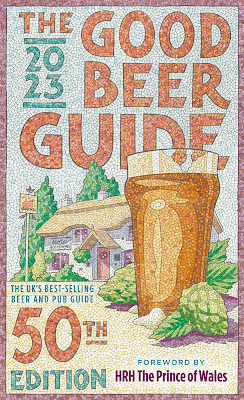A couple of weeks ago, whilst having a clear out of my bookshelves, I came across a rather weighty book, with the title, “1001 Beers You Must Try Before You Die.” Published In 2010 the book hasn't exactly aged well, as might be expected given the changes that have occurred in the brewing industry over the last decade and a half. So how did I come to own such a publication and, more importantly, how did it end up being forgotten about?
As far as I remember, the book was a Christmas present, from members of my department at work, back in the day when we used to buy things for one another during the festive season. My colleagues, knowing my interest in beer, expected me to be pleased with their choice of gift and, working on the premise that it’s the thought that counts, I was – to a point. At 960 pages, the sheer size of the book makes it unwieldy, to say the least, and whilst it works as a coffee table read, or a useful reference for those relatively new to the world of beer, it’s not the type of publication you can lug around with you.
It's the title and the concept behind the book, that I take issue with, perhaps even more so today than I would have done back in 2010. You see I've reached that stage in life where I feel entitled to be a grumpy old git, should I wish, and combined with a certain curmudgeonly approach, I’m following my late father’s lead of not suffering fools gladly. So, before going any further let's take a look at the concept behind 1001 Beers You Must Try Before You Die, and books with a similar title.Any book where the reader is told that they must do something, is guaranteed to get my hackles up. I’m no longer at school, or in the armed forces, so apart from complying with the law, and being an upstanding and decent moral citizen, I don’t enjoy being told I MUST do something. This applies even with a book about beer – my favourite drink, and when there’s a deadline involved, especially one as final as popping my clogs, I'm inclined to stick two fingers up at the whole bucket list concept.
For an author or a publisher to say, there are certain things you perhaps ought to do, or it would be nice for you do before you shuffle off this mortal coil, surely is the height of arrogance, and yet this is the basic premise of 1001 Beers You Must Try Before You Die. Now whilst I'm not averse to advice or recommendations, I do take exception at feeling pressurised into taking a certain course of action, and if someone tells me I MUST do something, I am inclined to do the polar opposite. Despite my interest in beer, drinking my way through 1001 different types and brands, in a glorified ticking exercise, really doesn’t float my boat. Furthermore, why choose such an arbitrary number, anyway? To answer that question, let’s look at Google, where a quick search throws up the following lists of things to do before you die. 1001 books you must read, 1001 albums you must hear, 1001 bucket list things to do, 1001 things a person should see, adventure bucket list ideas, nature & wildlife you must see, the list in fact is endless. I’d go so far as saying that a whole sub-genre has grown up around this concept. If you were to set out along this path, all that these books will do, is make you feel inadequate or that you haven’t accomplished even a fraction of the things listed. Ask yourself though, have the authors of these publications actually achieved all the things they claim to have done? Could they be lying, in an attempt to impress – and sell more books, of course? So having come this far, and questioned the whole concept behind all these things you MUST do, before popping your clogs, let’s take a closer look at “1001 Beers You Must Try Before You Die” prior to me donating my copy to the charity shop. The book is well laid out, with some well taken colour photographs of the beers concerned. The beers are almost exclusively in bottled form and are photographed alongside a glass of the beer itself. The glass invariably is a badged one as well just in case the reader has any doubts about what it is. Labels, beer mats or a depiction of the brewery concerned, are sometimes substituted for a photo of the beer. Accompanying each photo is some interesting information about the brewery concerned, the beer itself and also some tasting notes. I've therefore every reason to believe that the people who put this book together actually drank all these beers (between themselves, rather than individually), and if so all power to their collective elbows.1001 Beers, has the well-respected beer writer, Adrian Tierney-Jones as it's general editor, and his involvement certainly adds real kudos to the book. I've had the pleasure of meeting Adrian, and own a couple of his other books, so you could say I enjoy his written work and his style of writing. As general editor Adrian would have overseen the project, and whilst I'm sure he would have tried quite a few of these beers, I'm equally certain he didn't drink his way through the whole lot of them. The same would apply to the other contributors, who are described as, “An international panel of experts.”
As part of the quite lengthy introduction to the book, Adrian states, “My team of beer writers and I have chosen these beers because they are superb examples of brewing craftsmanship, are wonderful to taste, and will remind people time after time why beer is the best drink in the world.” He goes on to explain the project further, and why wouldn't he, because for a successful and well-known beer writer, this is a dream gig as they say. Along with the editorial, there’s also a preface from the actor Neil Morrissey, he of Men Behaving Badly Fame, and Boon fame. I’m not sure quite why he was chosen, apart from being in vogue, back in 2010. He also bought a North Yorkshire pub, and launched the Morrissey Fox range of beers in conjunction with chef Richard Fox. Make of that, what you will. The beers listed in 1001 Beers, are separated into five sections which group the beers into categories based on colour: amber, blond, white, dark and speciality beers. There is a detailed explanation as to why this classification was adopted, and an indication of which beer styles fit into the five categories. Although most of the beers featured are still in production, there are a few which seem lost or have not been brewed for some time. Would all the beers make a list of the “best” now? – I very much doubt it, as plenty of new beers have been launched since then, and by the law of averages alone, many will be better than some of those included in the original publication. I say original, because revised/updated editions of the book were published in 2013 and 2018. However, as far as I am aware, there hasn’t been an update since then. I would hazard a guess that the rise of “ticking” Apps, such as Untappd has rendered such guides superfluous – it’s size alone makes it very user-unfriendly. Some people swear by the book, stating they use it as a guide or reference book, but at 960 pages it’s just too large and unwieldy, and my own copy isn't exactly well-thumbed.As stated earlier, it’s on its way to the charity shop, unless anyone reading this, would like it instead. There’s no charge, although I imagine postage and packing would be costly, given it size. Before parting with it, I tallied up the number of beers listed, that I’ve actually drank. It’s a pretty low score, coming out at just 180, out of 1001, so I’ve got a lot of catching up to do, before I depart this world. Being realistic, this isn’t going to happen, and besides there plenty of other things I wish to do before heading off to that great pub in the sky!





















